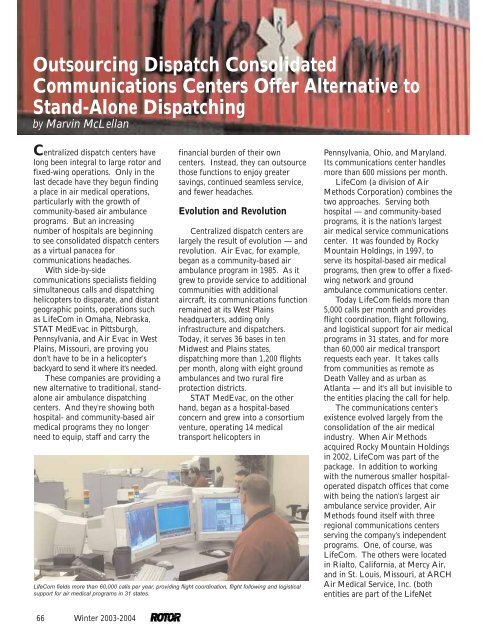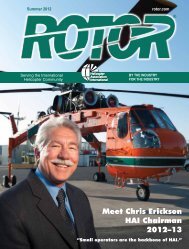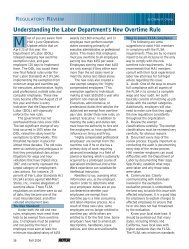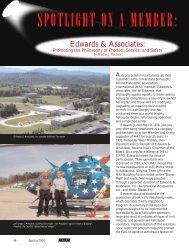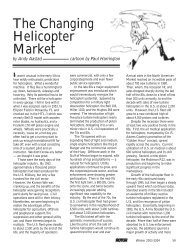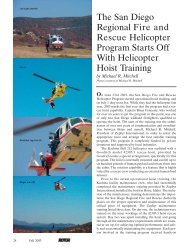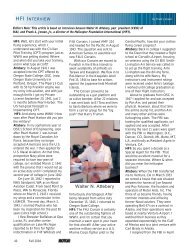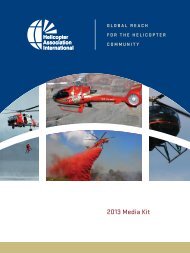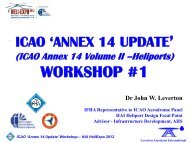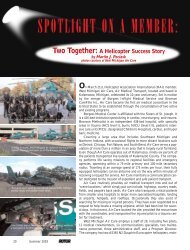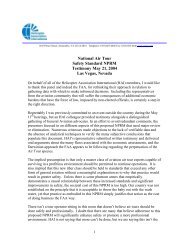Outsourcing Dispatch Consolidated Communications Centers Offer ...
Outsourcing Dispatch Consolidated Communications Centers Offer ...
Outsourcing Dispatch Consolidated Communications Centers Offer ...
Create successful ePaper yourself
Turn your PDF publications into a flip-book with our unique Google optimized e-Paper software.
<strong>Outsourcing</strong> <strong>Dispatch</strong> <strong>Consolidated</strong><br />
<strong>Communications</strong> <strong>Centers</strong> <strong>Offer</strong> Alternative to<br />
Stand-Alone <strong>Dispatch</strong>ing<br />
by Marvin McLellan<br />
Centralized dispatch centers have<br />
long been integral to large rotor and<br />
fixed-wing operations. Only in the<br />
last decade have they begun finding<br />
a place in air medical operations,<br />
particularly with the growth of<br />
community-based air ambulance<br />
programs. But an increasing<br />
number of hospitals are beginning<br />
to see consolidated dispatch centers<br />
as a virtual panacea for<br />
communications headaches.<br />
With side-by-side<br />
communications specialists fielding<br />
simultaneous calls and dispatching<br />
helicopters to disparate, and distant<br />
geographic points, operations such<br />
as LifeCom in Omaha, Nebraska,<br />
STAT MedEvac in Pittsburgh,<br />
Pennsylvania, and Air Evac in West<br />
Plains, Missouri, are proving you<br />
don't have to be in a helicopter's<br />
backyard to send it where it's needed.<br />
These companies are providing a<br />
new alternative to traditional, standalone<br />
air ambulance dispatching<br />
centers. And they're showing both<br />
hospital- and community-based air<br />
medical programs they no longer<br />
need to equip, staff and carry the<br />
financial burden of their own<br />
centers. Instead, they can outsource<br />
those functions to enjoy greater<br />
savings, continued seamless service,<br />
and fewer headaches.<br />
Evolution and Revolution<br />
Centralized dispatch centers are<br />
largely the result of evolution — and<br />
revolution. Air Evac, for example,<br />
began as a community-based air<br />
ambulance program in 1985. As it<br />
grew to provide service to additional<br />
communities with additional<br />
aircraft, its communications function<br />
remained at its West Plains<br />
headquarters, adding only<br />
infrastructure and dispatchers.<br />
Today, it serves 36 bases in ten<br />
Midwest and Plains states,<br />
dispatching more than 1,200 flights<br />
per month, along with eight ground<br />
ambulances and two rural fire<br />
protection districts.<br />
STAT MedEvac, on the other<br />
hand, began as a hospital-based<br />
concern and grew into a consortium<br />
venture, operating 14 medical<br />
transport helicopters in<br />
LifeCom fields more than 60,000 calls per year, providing flight coordination, flight following and logistical<br />
support for air medical programs in 31 states.<br />
Pennsylvania, Ohio, and Maryland.<br />
Its communications center handles<br />
more than 600 missions per month.<br />
LifeCom (a division of Air<br />
Methods Corporation) combines the<br />
two approaches. Serving both<br />
hospital — and community-based<br />
programs, it is the nation's largest<br />
air medical service communications<br />
center. It was founded by Rocky<br />
Mountain Holdings, in 1997, to<br />
serve its hospital-based air medical<br />
programs, then grew to offer a fixedwing<br />
network and ground<br />
ambulance communications center.<br />
Today LifeCom fields more than<br />
5,000 calls per month and provides<br />
flight coordination, flight following,<br />
and logistical support for air medical<br />
programs in 31 states, and for more<br />
than 60,000 air medical transport<br />
requests each year. It takes calls<br />
from communities as remote as<br />
Death Valley and as urban as<br />
Atlanta — and it's all but invisible to<br />
the entities placing the call for help.<br />
The communications center's<br />
existence evolved largely from the<br />
consolidation of the air medical<br />
industry. When Air Methods<br />
acquired Rocky Mountain Holdings<br />
in 2002, LifeCom was part of the<br />
package. In addition to working<br />
with the numerous smaller hospitaloperated<br />
dispatch offices that come<br />
with being the nation's largest air<br />
ambulance service provider, Air<br />
Methods found itself with three<br />
regional communications centers<br />
serving the company's independent<br />
programs. One, of course, was<br />
LifeCom. The others were located<br />
in Rialto, California, at Mercy Air,<br />
and in St. Louis, Missouri, at ARCH<br />
Air Medical Service, Inc. (both<br />
entities are part of the LifeNet<br />
66 Winter 2003-2004
Communication center specialists field simultaneous calls and dispatch helicopters to disparate and distant<br />
geographic points.<br />
operations of Air Methods).<br />
Interactive mapping, real-time<br />
flight dispatching, online weather<br />
radar and global positioning system<br />
(GPS) technology enable<br />
communications specialists to locate<br />
accident scenes quickly and pinpoint<br />
landing zones to within a few meters<br />
— even in unfamiliar areas.<br />
All this technology, along with<br />
response providers, hospitals and<br />
other agencies involved in the air<br />
medical response and patient<br />
transport process.<br />
These growing technological<br />
resources and capabilities are<br />
enabling communications centers to<br />
absorb other dispatch centers and<br />
extend outsourcing services to other<br />
hospital- as well as communitybased<br />
programs — regardless of<br />
their location.<br />
<strong>Outsourcing</strong> Benefits<br />
training class for dispatchers costs<br />
about the same, regardless of<br />
the number of participants. And<br />
the essential wiring for a<br />
communications center serving<br />
multiple programs versus one is also<br />
similar. By providing the services on<br />
a much larger level and from one<br />
location, an outsourced dispatch<br />
center can do the job more<br />
efficiently and then pass the<br />
benefits along to programs. It's a<br />
significant source of savings, the<br />
communications centers maintain.<br />
But for many program directors,<br />
a primary benefit to outsourcing the<br />
communications function, in<br />
addition to the cost savings, is the<br />
increased internal efficiencies.<br />
<strong>Outsourcing</strong> dispatch enables<br />
program directors to focus more on<br />
the aviation and medicine that go<br />
into life-saving flights and worry less<br />
about the logistics of making them<br />
happen.<br />
Marvin McLellan, is director of<br />
marketing for LifeCom.<br />
two-way radios, telephone, data and<br />
alphanumeric paging are woven into<br />
a single work station for each<br />
dispatcher. From any given desk,<br />
dispatchers then can conduct<br />
conference calls, patch calls and<br />
transfer flight and patient<br />
information between flight medical<br />
crews, pilots, ground emergency<br />
LifeCom Director Bill Irland<br />
says the outsourcing idea is catching<br />
on, especially with the increasing<br />
financial pressures imposed by<br />
healthcare reimbursement changes.<br />
"It's a common conundrum," he said.<br />
"Programs are being asked — and<br />
expected — to provide increased<br />
service at lower costs. There are<br />
only so many things you can do to<br />
save before you start sacrificing<br />
quality. But outsourcing dispatch<br />
services is a simple yet effective way<br />
to provide a higher level of quality<br />
while still saving money."<br />
Medical dispatching is complex.<br />
Not only does it require gathering<br />
medical and demographic data, but<br />
also it requires an understanding of<br />
aviation and medical terminology —<br />
not to mention the computers and<br />
software. It takes several months to<br />
train qualified dispatchers and<br />
competitive salary and benefits<br />
packages to keep them.<br />
Of course, many savings come<br />
from sheer economy of scale. A<br />
Winter 2003-2004<br />
67
continued from page 33<br />
you were in the air?<br />
Carl Brady: Well, I've had 9 engine<br />
failures in my life, in the old 47<br />
series.<br />
Carol Brady (to Carl): What about<br />
that day you called me and said<br />
"Honey, I just rolled a helicopter up<br />
in a ball?"<br />
Carl Brady: Yes, I had one accident.<br />
Once, the engine quit and I<br />
autorotated down from 75 feet to a<br />
road on a side hill. I got the right<br />
skid on the road and the left skid<br />
was still 3 feet in the air, and we<br />
rolled over to the left. Nobody was<br />
hurt. I wasn't hurt. But it sure tore it<br />
up. The blade hit the ground, of<br />
course, and when that happens<br />
everything turns to crap.<br />
HAI: Did you ever fly that helicopter<br />
again?<br />
Carl Brady: Oh yeah. In fact, I think<br />
that's the one that was dedicated<br />
yesterday.<br />
HAI: It's difficult to separate Era's<br />
from the story of the Brady family as<br />
a whole. Mrs. Brady, you've<br />
commented on how important family<br />
was to both of you as you built your<br />
business. How did you and Mr.<br />
Brady first meet?<br />
Carol Brady: He was a soda jerk,<br />
and I took a job as a cashier. There<br />
were 6 boys working there. Out of<br />
the 6, one was married, and the<br />
other five put a quarter in the paper<br />
cup to see who could get the first<br />
date with me.<br />
Carl Brady: And I won, so I got the<br />
first date with her.<br />
Carol Brady: He told the owner, "I'd<br />
like to use the van to drive Carol<br />
home." And the owner said, "Well<br />
that's ok." I worked the shift from six<br />
to eleven at night, so when my<br />
stepmother took me to work next,<br />
Carl said, "you don't have to pick<br />
Carol up at 11 o'clock. I have the<br />
company van, I'll drop her off." Well,<br />
that pleased my stepmother.<br />
(Laughs.) Carl said the first time he<br />
took me home, I had my hand on the<br />
door the whole time.<br />
Carl Brady: She had her hand on the<br />
handle all the way home. The minute<br />
I stopped in front of the house, she<br />
opened the door and ran outside and<br />
68 Winter 2003-2004<br />
looked at me.<br />
Carol Brady: Well, my stepmother<br />
told me these guys were "whirly!" I<br />
didn't know what "whirly" was, and I<br />
was a pretty shy girl.<br />
Carl Brady: I wasn't whirly. (Smiles.)<br />
I thought I was I guess.<br />
Carol Brady: Then Carl went to<br />
Seattle, because the owner of the ice<br />
cream parlor was letting the men go<br />
so he could hire women, because of<br />
the war. He started going to the<br />
University of Washington, and would<br />
hitchhike over every weekend to see<br />
me. The first time he came to see<br />
me, he brought a bouquet of flowers<br />
for my stepmother and a corsage for<br />
me. He had written a letter asking<br />
me out to dinner and a show. He did<br />
everything proper, you know. It was<br />
so proper that it made my<br />
stepmother mad, because I had a<br />
stepsister that was five months older<br />
that nobody was asking out. My<br />
stepmother said, "you can't go out<br />
with him, he's too whirly."<br />
Carl Brady: So we snuck around till<br />
we eloped.<br />
Carol Brady: We were married in<br />
the Methodist church. His friend<br />
stood up with him, and mine with<br />
me.<br />
HAI: How hard was the commute<br />
from Yakima to Anchorage when<br />
you first moved to Alaska?<br />
Carol Brady: It was very hard. The<br />
airplane took off from Yakima at<br />
7:30 in the evening, and sometimes<br />
I'd have all three kids. We'd have to<br />
wait in Seattle for a second plane to<br />
take off at 5:30 in the morning, and<br />
I'd get into Anchorage and Carl<br />
would be all dressed up and swifted<br />
up, and here I'd just spent 6 hours in<br />
this old rattley DC-6, dead tired, and<br />
couldn't wait to go to bed. And he<br />
was so excited about me coming. It<br />
was hard. We did that for 12 years.<br />
HAI: Was it a tough decision to<br />
move the family to Alaska?<br />
Carol Brady: I actually sat down and<br />
wrote a 5 page letter to Carl and said<br />
he was either going to have to move<br />
back to Yakima, or we were going to<br />
have to move to Alaska. So Carl<br />
called me on the phone. I couldn't<br />
call very often because it was 75<br />
dollars, and that's how much our<br />
house payment was! So he called and<br />
said, "I'd love for my family to come<br />
to Alaska, I just never thought you'd<br />
come." I told him that it's important<br />
we have our family together.<br />
HAI: Mrs. Brady, you once soloed a<br />
Taylor Craft.<br />
Carol Brady: Yes. I have a license. I<br />
heard Carl tell somebody that I'd<br />
never fly, so I walked out and hired<br />
the man that taught Carl to teach<br />
me. At the time I was expecting! But<br />
I learned, and I landed twice by<br />
myself, and that's it. Just to show<br />
that I could do it.<br />
Carl Brady: Yep. I watched her do<br />
it. With my heart pounding.<br />
Carol Brady: But I didn't have a<br />
desire to continue. I was more<br />
interested in the children.<br />
HAI: And then there was the Mrs.<br />
America pageant?<br />
Carol Brady: I had been a model<br />
when I was in Yakima, and when we<br />
moved to Alaska I walked into a<br />
store called the Hat Box and the lady<br />
asked me to model for her. I<br />
immediately made friends with the<br />
other ladies here. When the<br />
Anchorage Women's Club asked me<br />
to run for Mrs. Anchorage in 1963,<br />
Carl said, "Tell 'em you're too old."<br />
So I turned back to them and said,<br />
"I'll be happy to!"<br />
HAI: And you won?<br />
Carol Brady: I won the Mrs.<br />
Anchorage, and won the Mrs.<br />
Alaska, and went to the Mrs.<br />
America pageant. I felt I could have<br />
won it, but I had a five year old, and<br />
he was more important to me than<br />
running around the country.<br />
HAI: Aside from flying, Mr. Brady,<br />
you've had a political career. You've<br />
served in both houses of the state<br />
legislature, and you're very close to<br />
Senator Stevens. How did that<br />
relationship begin?<br />
Carl Brady: We both ran for the<br />
State House in 1965. We were both<br />
elected and we lived together in<br />
Juneau.<br />
HAI: And how does the five-dollar<br />
bill story go?<br />
Carl Brady: It was a one-dollar bill.<br />
He tore it in half and gave me half,<br />
and I signed it, and he took that half.<br />
Then he signed the other half and
gave it to me. It was whatever we<br />
wanted to do for one another in the<br />
Senate or elsewhere, any time.<br />
HAI: Did you ever try to cash it in?<br />
Carl Brady: The one time I asked<br />
him to do anything, I asked him to<br />
support Wally Hickel for governor<br />
when Wally was running against Jay<br />
Hammond. Jay Hammond was the<br />
incumbent. Senator Stevens told me<br />
that the tradition of the U.S. Senate<br />
was that you support the incumbent,<br />
and you never vary from that. I<br />
asked him what would happen if I<br />
cashed in my chip. He said, "I'll have<br />
to resign from the Senate." And he<br />
meant it. He meant every word of it.<br />
So I never tried that on him.<br />
(Pauses.) But I thought about it.<br />
HAI: Final question. In the early<br />
years, when you were literally<br />
building the company job by job,<br />
there must have been tough times.<br />
As a businessman, how did you face<br />
them?<br />
Carl Brady: Well, we didn't make<br />
money every year, but most of the<br />
time we made money. When we<br />
didn't make money, it was a disaster<br />
as far as I was concerned. Just a<br />
disaster. I started preaching to my<br />
employees about saving here and<br />
saving there, to cut costs. But to<br />
answer your question, what we did is,<br />
we survived!<br />
Now when we sold out to Rowan<br />
Companies Inc. out of Houston,<br />
Texas, we did it because we had to<br />
expand. There was the discovery of<br />
oil on the North Slope, and we had<br />
many calls for helicopters that we<br />
couldn't provide. We had to expand<br />
in order to stay in business. It was<br />
either that or go public, and we<br />
decided to sell.<br />
We had several offers. We had<br />
one from Bill Lear. He came up here<br />
and offered me two million for the<br />
company. We were asking two and a<br />
half. Lear said, "I'll give you two<br />
million and then I'll sell the company<br />
next year, and I'll give you the other<br />
half million. Until then, that's the<br />
best I can do."<br />
I told him I couldn't take it<br />
because it would have been robbing<br />
my partners out of their share. I<br />
couldn't do that. My partners from<br />
Rotor Aids were two fine people —<br />
Roy Falconer and Joe Seward.<br />
Anyway, the Lear thing fell<br />
through. We finally sold to Rowan<br />
Company. We got one million down,<br />
and notes for the rest of it. And they<br />
paid just the way they were supposed<br />
to.<br />
After the dedication ceremony,<br />
Senator Stevens took a moment to<br />
speak with HAI about Brady's<br />
contributions. "His work changed the<br />
methods of surveying in Alaska,"<br />
Stevens said. "We would never have<br />
had the coast mapped if it hadn't<br />
been for the application of the<br />
methods he devised. He made the<br />
wilderness accessible. Literally, he<br />
took us from a millimeter to a mile.<br />
We went places we couldn't have<br />
gone otherwise."<br />
Visit HAI’s<br />
g i f t s h o p at<br />
www.rotor.com<br />
Winter 2003-2004<br />
69


